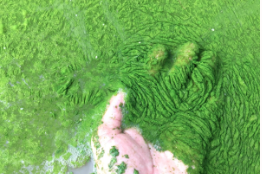NJDEP Provides $13.5 Million to Address Harmful Algal Blooms
Published on by Water Network Research, Official research team of The Water Network in Academic
NJDEP Provides $13.5 Million to Address Harmful Algal Blooms TRENTON, NJ — The NJ Department of Environmental Protection is making $13.5 million in funding available for local projects to improve water quality and help prevent, mitigate and manage harmful algal blooms in lakes and ponds, building upon the state’s HAB response strategy announced by Gov. Phil Murphy in November.
Exposure to blooms can cause adverse health effects, including rashes, allergy-like reactions, flu-like symptoms, gastroenteritis, respiratory irritation and eye irritation. Exposure to a bloom that is actively producing cyanotoxins may even result in liver toxicity and neurological consequences. People, pets and wildlife are all susceptible if they come into contact with or ingest water experiencing a bloom. “Harmful algal blooms are creating real hardships for the people of New Jersey, affecting livelihoods, local economies and tourism,” DEP Commissioner Catherine R. McCabe said. “The Murphy administration is committed to moving forward quickly to make financial resources available for local projects that will reduce the occurrence of harmful algal blooms, improving our quality of life and better protecting public health and the environment.” The DEP has formally issued requests for proposals for $3.5 million in grants to fund planning and projects to help local management, response and mitigation of HABs through proven and innovative projects. This program is open to a wide variety of potential applicants, including local government agencies, academic institutions and nonprofits. In addition, the department has issued a draft Intended Use Plan for public comment that earmarks $10 million in Clean Water State Revolving Fund money as principal-forgiveness funding for projects that address HABs by improving water quality. DEP is encouraging interested potential applicants – primarily local and county government agencies – to apply for funding through this program as soon as possible. Murphy announced the funding as part of a comprehensive effort to address the increasing number of harmful algal blooms that occurred across the state last year. More than 70 suspected blooms were reported, with 39 confirmed. These blooms resulted in health and water-contact advisories and closures of bathing beaches and, in some cases, had direct impacts on tourism-related businesses. This effort also includes an enhanced program of science-based prevention, mitigation, study and response. “Specifically, the DEP has issued a request for proposals for harmful algal bloom management matching grants totaling $2.5 million to fund the implementation of innovative or proven projects to manage HABs through prevention and mitigation,” a department press release reads. “Through this 2:1 matching grant, the DEP will enhance its local partners’ investments in HAB prevention and mitigation projects by providing $2 in funding for every $1 invested by a grant applicant. “The DEP has also set aside $1 million from a $3.5 million nonpoint source pollution grant program for watershed or lakeshed planning to address harmful algal blooms by reducing nutrients in stormwater. No local match would be required for an applicant to be eligible for these planning funds.” To view the requests for proposals, including requirements for proposal submissions, and for more information about the state’s Water Quality Restoration Grants Program, visit nj.gov/dep/wms/bears/npsrestgrants.html. In addition, the $10 million DEP has proposed to make available as principal-forgiveness funding through the Clean Water State Revolving Fund provides potential applicants with a cost-effective way to implement projects, such as wastewater and stormwater improvements, that will reduce pollutants that help fuel harmful algal blooms. “The principal-forgiveness funding (capped at $2 million per project) could cover as much as half the cost of these projects,” said the department. “The DEP and the New Jersey Water Bank will provide the balance through a blend of zero-interest and market-rate funding that results in low-interest loans for applicants.” For information, visit nj.gov/dep/dwq/cwpl.htm. “We strongly encourage interested parties to reach out to us as soon as possible to take advantage of this unique funding opportunity,” said Michele Putnam, assistant commissioner for water resources management. “At this stage, all applicants need is an idea. We will assign a project manager for each project to help guide applicants through design, permitting and program requirements.” For more information on harmful algal blooms, visit state.nj.us/dep/hab. —J.K.-H |
Media
Taxonomy
- Algae
- Algae Treatment
 According to the DEP, “Harmful algal blooms, also known as HABs, are not true algal blooms. Rather, they are caused by naturally occurring cyanobacteria that can reproduce to unhealthful levels under certain conditions, including sunlight, nutrients from sources such as fertilizers and improperly operating septic systems, warm weather and stagnant water. They frequently form dense mats, resembling pea soup or spilled paint.”
According to the DEP, “Harmful algal blooms, also known as HABs, are not true algal blooms. Rather, they are caused by naturally occurring cyanobacteria that can reproduce to unhealthful levels under certain conditions, including sunlight, nutrients from sources such as fertilizers and improperly operating septic systems, warm weather and stagnant water. They frequently form dense mats, resembling pea soup or spilled paint.”